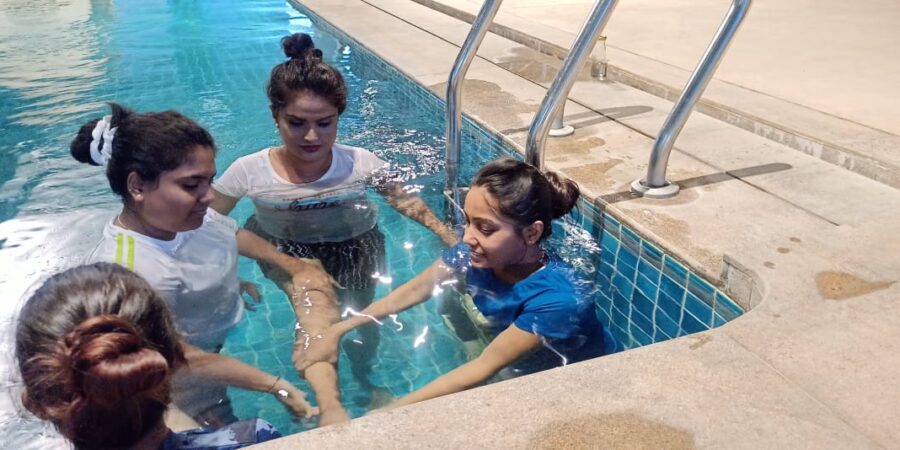If you do a workout in water it takes less effort at movement and more benefit gets than the land workout, since you are in the water it motivates you to perform exercises, if anyone workout in the water, you don’t feel more sweat but same time burns more calories than a normal workout on land.
According to the need can improvise the workout at intermediate and advanced levels. It helps to improve strength in muscles and joints, endurance, cardiac health, and pulmonary health even it helps to improve the circulation in the abdominal region and helps to improve circulation in smooth muscles.
In general, also aquatic exercises are more popular and more beneficial. From a physiotherapy point of view also there is therapeutic benefit patients get. Which helps the patient to get faster recovery in their relative issues with less effort.
Beginners should not start exercises with resistance or accessories in the pool, should not exert in the beginning, don’t go in deeper levels of the pool, and don’t do water activities if you are down with flu or any acute infection. Anyone should not do continuous deep breathing exercises.
Water workouts are generally safe and beneficial for people of various age groups and fitness levels. Here’s a list of who can benefit from working out in the water:
- Seniors: Water exercises are gentle on joints, making them an excellent option for older adults to maintain mobility, strength, and cardiovascular health.
- Pregnant Women: Water workouts offer a low-impact way for expectant mothers to stay active and relieve the strain on their joints during pregnancy.
- Individuals with Joint Issues: Those with arthritis, joint pain, or orthopaedic conditions can find relief in water due to its buoyancy and reduced impact.
- Athletes: Athletes can use water workouts for cross-training, injury recovery, and improving overall fitness.
- Beginners: Water workouts provide a comfortable environment for beginners to exercise, as the water’s support reduces the risk of injury.
- People in Rehabilitation: Individuals recovering from injuries or surgeries can perform rehabilitation exercises in water to aid their recovery process.
- Anyone Looking for a Fun Workout: Water exercises can be enjoyable and refreshing, appealing to people who want to make fitness a fun experience.
Tips
- Don’t overexert yourself; listen to your body and take breaks when needed.
- Don’t push yourself beyond your comfort level, especially if you are new to water exercises or have medical concerns.
- Don’t forget to check the water depth and be aware of the pool rules and safety guidelines.
- Don’t rely solely on water workouts; it’s essential to have a balanced fitness routine that includes land-based exercises as well
Water workouts offer several advantages compared to traditional land-based exercises
- Low-Impact: Exercising in water significantly reduces the impact on joints and bones, making it an excellent option for individuals with arthritis, joint pain, or those recovering from injuries. This lowers the risk of musculoskeletal injuries while still providing an effective workout.
- Full-Body Workout: Water workouts engage multiple muscle groups simultaneously due to the water’s resistance, providing a full-body workout. This can lead to improved strength, endurance, and overall fitness.
- Cardiovascular Conditioning: Water aerobics and swimming can elevate the heart rate and provide cardiovascular benefits without putting stress on the joints, making it a safe option for people with heart conditions or those looking for low-impact cardio exercises.
- Improved Flexibility and Balance: The water’s dynamic environment requires constant stabilization, which can enhance flexibility, balance, and core strength.
- Cooling Effect: Exercising in water helps regulate body temperature, especially in hot climates or during intense workouts. This can make workouts more comfortable and prevent overheating.
- Reduced Muscle Soreness: Water’s buoyancy helps support the body during exercises, reducing muscle soreness that might be experienced with high-impact land-based workouts.
- Accessibility: Water workouts are suitable for individuals of all fitness levels and ages, including seniors, pregnant women, and beginners, providing a safe and inclusive exercise option.
- Rehabilitation and Injury Recovery: Water workouts can be used for rehabilitation purposes and injury recovery, as they provide a controlled environment with reduced impact on injured areas.
Read the full story that first appeared in Deccan Chronicle dated August 11, 2023 here:

